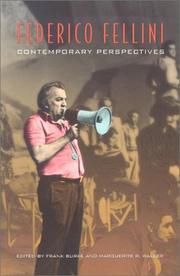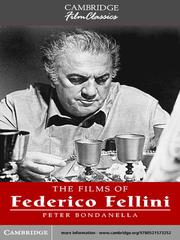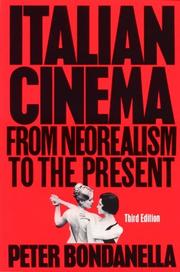| Listing 1 - 3 of 3 |
Sort by
|

ISBN: 0802076475 0802006965 9786612003172 1282003178 1442674830 9781442674837 9781282003170 9780802006967 9780802076472 Year: 2002 Publisher: Toronto ; Buffalo ; London University of Toronto Press
Abstract | Keywords | Export | Availability | Bookmark
 Loading...
Loading...Choose an application
- Reference Manager
- EndNote
- RefWorks (Direct export to RefWorks)
Federico Fellini remains the best known of the postwar Italian directors. This collection of essays brings Fellini criticism up to date, employing a range of recent critical filters, including semiotic, psychoanalytical, feminist and deconstructionist. Accordingly, a number of important themes arise - the reception of fascism, the crisis of the subject, the question of agency, homo-eroticism, feminism, and constructions of gender. Since the early 1970s, a slide in critical and theoretical attention to Fellini's work has corresponded with an assumption that his films are self-indulgent and lacking in political value. This volume moves the discussion towards a politics of signification, contending that Fellini's evolving self-reflexivity is not mere solipsism but rather a critique of both aesthetics and signification. The essays presented here are almost all new - the two exceptions being important signifiers in Fellini studies. The first, Frank Burke's "Federico Fellini: Reality/Representation/Signification" laid the foundation in the late 1980s for considering Fellini's work in the light of postmodernism. The second, Marguerite Waller's "Whose Dolce Vita is this Anyway?: The Language of Fellini's Cinema" (1990), provides a contemporary re-reading of Fellini's most successful film. This lively and ambitious collection brings a new critical language to bear on Fellini's films, offering fresh insights into their underlying issues and meaning. In bringing Fellini criticism up to date, it will have a significant impact on film studies, reclaiming this important director for a contemporary audience

ISBN: 1107113571 1280417072 0511175957 1139145754 0511065728 0511059418 0511323549 0511613342 0511067852 9780511065729 9780511059414 9780511067853 9786610417070 6610417075 0521573254 9780521573252 0521575737 9780521575737 9780511613340 0511090269 9781107113572 9781280417078 9780511175954 9781139145756 9780511323546 Year: 2002 Publisher: Cambridge, UK ; New York, NY, USA : Cambridge University Press,
Abstract | Keywords | Export | Availability | Bookmark
 Loading...
Loading...Choose an application
- Reference Manager
- EndNote
- RefWorks (Direct export to RefWorks)
The Films of Federico Fellini examines the career of one of Italy's most renowned filmmakers through close analysis of five masterpieces that span his career: La Strada, La Dolce Vita, 8 1/2, Amarcord and Interview. Providing an overview of Fellini's early career as a cartoonist and scriptwriter for neorealist directors such as Roberto Rossellini, this study traces the development of Fellini's unique and personal cinematic vision as it transcends Italian neorealism. Rejecting an overtly ideological approach to Fellini's cinema, Bondanella emphasizes the director's interest in fantasy, the irrational and individualism.
Motion pictures --- Motion picture industry --- Biography --- Employees --- Fellini, Federico --- Fellini, Frederico --- Fellini, F. --- Felini, Federiḳo --- פליני, פדריקו --- Fellas, --- Criticism and interpretation.

ISBN: 0826412475 Year: 2002 Publisher: New York (N.Y.) Continuum
Abstract | Keywords | Export | Availability | Bookmark
 Loading...
Loading...Choose an application
- Reference Manager
- EndNote
- RefWorks (Direct export to RefWorks)
film --- filmgeschiedenis --- twintigste eeuw --- Italië --- neorealisme --- Rosselini Roberto --- De Sica Vittorio --- Visconti Luchino --- Antonioni Michelangelo --- Fellini Federico --- spaghettiwesterns --- westerns --- Leone Sergio --- Pasolini Pier Paolo --- Bertolucci Bernardo --- Moretti Nanni --- Avati Pupi --- Scola Ettore --- Taviani Paolo --- Taviani Vittorio --- Wertmüller Lina --- Cavani Liliana --- Bellocchio Marco --- Petri Elio --- 791.43 --- Motion pictures --- History --- History.
| Listing 1 - 3 of 3 |
Sort by
|

 Search
Search Feedback
Feedback About UniCat
About UniCat  Help
Help News
News